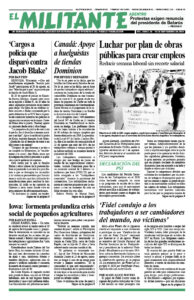Federal authorities Aug. 26 executed Lezmond Mitchell, a 38-year-old Navajo, despite strong objections by the leaders of the Navajo Nation. This is the only time U.S. authorities have executed a Native American for a crime committed on a Native American reservation over the objection of the tribe.
The decision by federal officials to go ahead with this execution — the fourth this summer after 17 years without any — signifies a further chipping away of sovereign rights of Native peoples living on tribal land. Appeals to the U.S. Supreme Court to halt it and to President Donald Trump requesting clemency were made, all to no avail.
In 2001, Mitchell, then 20, and Johnny Orsinger, a teenager at the time, were hitchhiking from Round Rock, Arizona, on the Navajo Nation to Gallup, New Mexico. They were picked up by Alyce Slim, 63, who was traveling with her 9-year-old granddaughter, Tiffany Lee. After Slim stopped to let them out of her pickup truck on the reservation, the two men proceeded to kill both of them.
In federal court, Mitchell was convicted of first-degree murder, felony murder and “carjacking resulting in death” and was sentenced to die. Orsinger, a minor at the time, was sentenced to life in prison.
The federal government didn’t have any jurisdiction on tribal land until Congress passed the Major Crimes Act in 1885. This law was put in place after the Supreme Court two years earlier ruled that federal officials had no authority to prosecute and sentence to death a Native man for a murder committed on the Great Sioux Reservation.
Since then the federal government has increasingly seized more and more control over tribes’ sovereign legal proceedings.
While the Major Crimes Act gave federal authorities jurisdiction over certain crimes committed on tribal land, including murder, Native American tribes under federal law can decide whether their members are given the death penalty. While carjacking wasn’t covered under the 1885 law, as cars didn’t exist then, the administration of President Bill Clinton expanded use of the federal death penalty to cover “carjacking resulting in death” and about 60 other offenses.
“Our decision not to accept the death penalty in federal cases remains a Navajo decision,” said a statement issued by Navajo Nation President Jonathan Nez and Vice President Myron Lizer, “but in this instance the federal government ignored the Navajo Nation. This is an affront to our Nation because we should be the ones to decide these matters. The federal government charged a crime that was added in 1994 to the Federal Death Penalty Act and blindsided the Navajo Nation’s position.”
The National Congress of American Indians, 13 tribal governments and Native Americans from more than 90 tribes across the country supported Mitchell’s request that his death sentence be commuted to life without parole.
The Inter-American Commission on Human Rights also urged the U.S. government to stay the execution of Mitchell.
All these objections were dismissed with disdain and the execution took place as scheduled.

